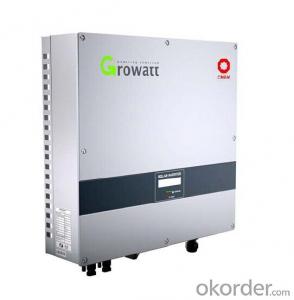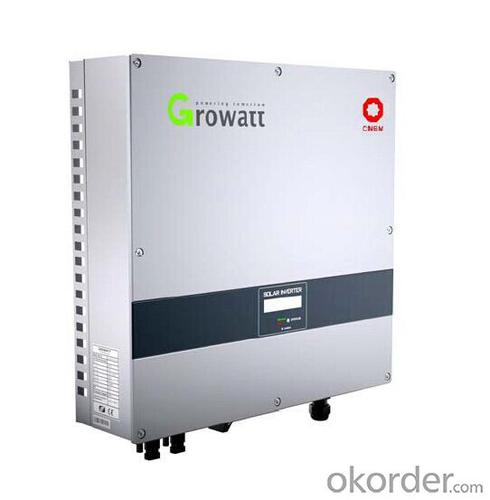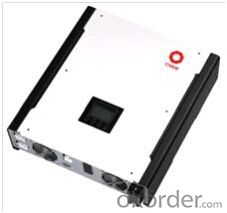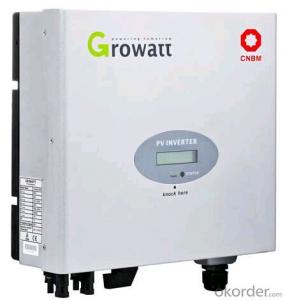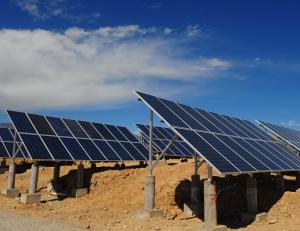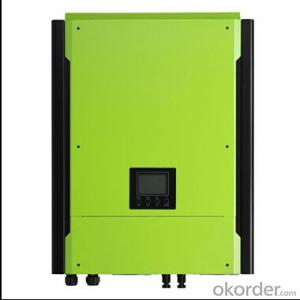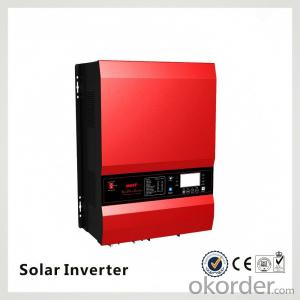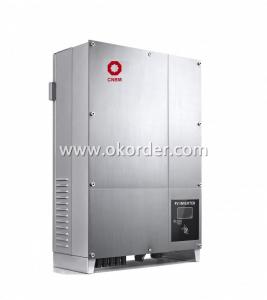300kw Solar Inverter 2kw On-grid Inverter with Energy Storage 1kw/2kw/3kw Hybrid Inverter
- Loading Port:
- China main port
- Payment Terms:
- TT OR LC
- Min Order Qty:
- 1000 watt
- Supply Capability:
- 100000 watt/month
OKorder Service Pledge
OKorder Financial Service
You Might Also Like
Introduction
On-grid Inverter with Energy Storage 2kW/3kW hybrid inverter
Pure sine wave output
Microprocessor controlled to guarantee stable charging system
Multiple operations: Grid tie, Off grid, and grid tie with backup
Built-in MPPT solar charger
LCD display panel for comprehensive information
Multiple communication
Green substitution for generators
User adjustable charging current up to 25A
Features
Feed-in is not only choice
In comparison with conventional grid-tie inverter, CNBM-H is able to not only feed-in power to
grid but also store solar power to battery for future usage and directly power to the loads.
Save money by discharging battery for self-consumption first
CNBM-H can save money by using battery energy first when PV energy is low. Until battery
energy is low, CNBM will extract AC power from the grid.
Power backup when AC failed
CNBM-H can operate as an off-grid inverter to provide continuous power even without the grid.
It’s perfect power solution for remote regions or temporary AC power source such as camping or flea market.
Images
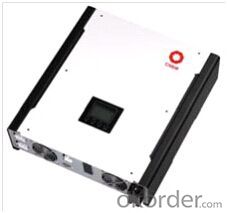

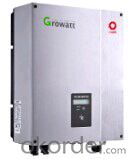

Sepecification
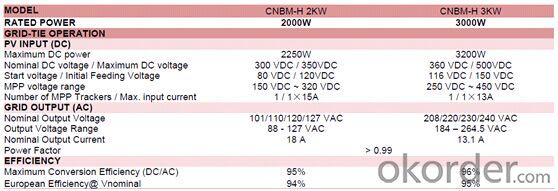
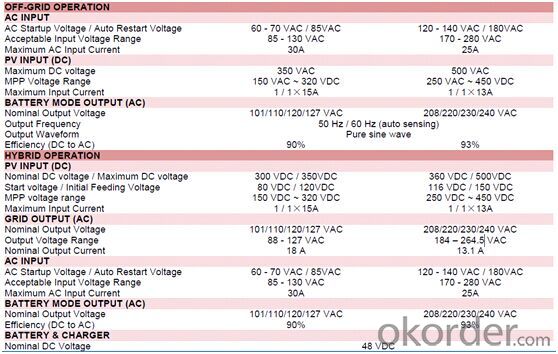
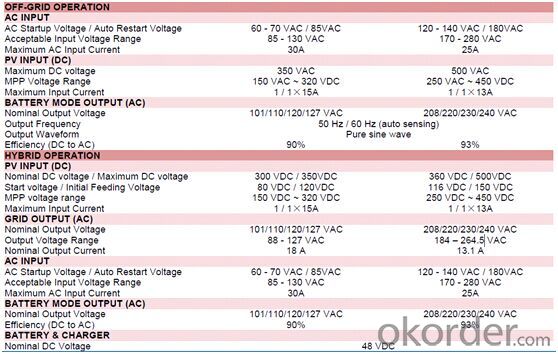
FAQ
Q1: How to choose a right inverter?
A1:Tell us your demand, then our sales will recommend a suitable inverter to you.
Q2: What's the different between inverter and solar inverter?
A2: Inverter is only accept AC input, but solar inverter not only accept AC input but also can connect with solar panel to accept PV input, it more save power.
Q3: How about the delivery time?
A3: 7 days for sample; 25 days for bulk order.
Q4: What is the warranty of inverter?
A4: 5/10 years warranty on CNBM-Solar product.
Q5: How to solve the technical problem?
A5: 24 hours after-service consultancy just for you and to make your problem to solve easily.
- Q: How does a solar inverter handle variations in temperature?
- A solar inverter is designed to handle variations in temperature by incorporating temperature sensors and thermal management systems. These sensors monitor the temperature of the inverter and its components, allowing it to adjust its operations accordingly. The inverter's thermal management system helps dissipate excess heat and prevent overheating, ensuring optimal performance and longevity. Additionally, advanced inverters may have temperature compensation algorithms that adjust the voltage and power output to compensate for the temperature changes, maximizing energy production.
- Q: Can a solar inverter be used with multiple solar arrays?
- Yes, a solar inverter can be used with multiple solar arrays. In fact, many solar power systems consist of multiple arrays connected to a single inverter. The inverter's role is to convert the DC power generated by the solar arrays into usable AC power for household or grid consumption. By connecting multiple arrays to a single inverter, it allows for greater energy production and efficiency, making it a common practice in larger solar installations.
- Q: How do you connect a solar inverter to the electrical grid?
- To connect a solar inverter to the electrical grid, you typically follow a few steps. First, ensure that your solar panels are properly installed and generating electricity. Then, connect the DC output of the solar panels to the DC input of the inverter. Next, connect the AC output of the inverter to your home's electrical distribution panel or directly to the electrical grid through a utility meter. Finally, consult with a qualified electrician to ensure that the installation meets all relevant safety and electrical codes.
- Q: Can a solar inverter be used with a battery backup system?
- Yes, a solar inverter can be used with a battery backup system. The solar inverter converts the DC power generated by the solar panels into AC power that can be used to power appliances and charge batteries. The battery backup system stores excess solar energy for use during times when the sun is not shining, providing a reliable source of power even when the solar panels are not producing electricity.
- Q: How does a solar inverter handle power export limitations imposed by the grid?
- A solar inverter handles power export limitations imposed by the grid through a process known as grid-tied or utility interactive operation. It continuously monitors the grid's voltage and frequency, adjusting the power output of the solar system accordingly. If the grid is unable to accept additional power due to export limitations, the inverter will reduce the output of the solar system to ensure compliance with the grid's requirements. This allows for a smooth and safe integration of solar power into the grid, preventing any potential disruptions or overloading.
- Q: Can a solar inverter be used with a solar-powered electric gate system?
- Yes, a solar inverter can be used with a solar-powered electric gate system. The solar inverter is responsible for converting the DC power generated by the solar panels into AC power, which is required to operate the electric gate system. This allows the solar energy to be utilized efficiently in powering the gate system.
- Q: Can a solar inverter be connected to a smartphone app for monitoring?
- Yes, a solar inverter can be connected to a smartphone app for monitoring. Many solar inverter manufacturers offer mobile apps that allow users to monitor and control their solar power systems remotely through their smartphones. These apps provide real-time data on energy production, system performance, and can also enable users to adjust settings and receive alerts or notifications related to their solar power system.
- Q: Can a solar inverter be used with solar-powered remote sensing systems?
- Yes, a solar inverter can be used with solar-powered remote sensing systems. A solar inverter is an essential component of a solar power system that converts the direct current (DC) produced by solar panels into alternating current (AC) electricity, which can be used to power various devices and systems. This includes remote sensing systems, which rely on solar power to operate in remote or off-grid locations. The solar inverter ensures that the electricity generated by the solar panels is compatible with and can power the remote sensing system effectively.
- Q: Can a solar inverter be used with different types of power conditioning units?
- Yes, a solar inverter can be used with different types of power conditioning units. Solar inverters are designed to convert the DC power generated by solar panels into AC power that can be used by various electrical devices. They can be compatible with different types of power conditioning units, such as battery storage systems or grid-tied inverters, depending on the specific requirements and setup of the solar power system.
- Q: How do you choose the right input voltage range for a solar inverter?
- When choosing the right input voltage range for a solar inverter, it is essential to consider the specifications and requirements of the specific solar panels being used. The input voltage range should be compatible with the voltage output of the solar panels to ensure optimal performance and efficiency. Additionally, factors such as the system size, installation location, and local regulations should also be taken into account to determine the appropriate input voltage range for the solar inverter.
Send your message to us
300kw Solar Inverter 2kw On-grid Inverter with Energy Storage 1kw/2kw/3kw Hybrid Inverter
- Loading Port:
- China main port
- Payment Terms:
- TT OR LC
- Min Order Qty:
- 1000 watt
- Supply Capability:
- 100000 watt/month
OKorder Service Pledge
OKorder Financial Service
Similar products
Hot products
Hot Searches
Related keywords
